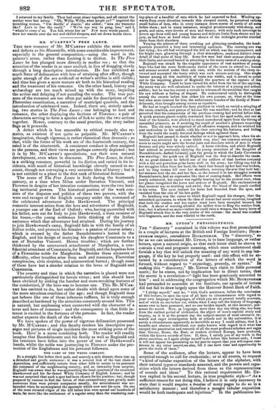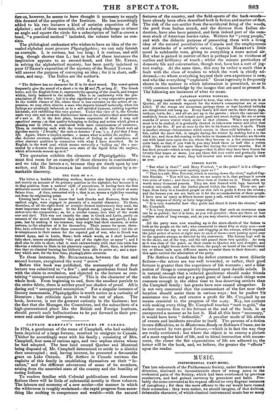MR. UPTON ' S PHTSIOGLYPHICS.
THE " discovery" contained in this volume was first promulgated in a couple of lectures at the British and Foreign Institute; BUCK- INGHAM auspice, emendatore BUCKINGHAM The "discovery," so far as we can understand Mr. UPTON, is to base language, or rather letters, upon a natural origin, so that each letter shall be shown to contain a real and pregnant meaning, which once understood shall furnish a key that will unlock the meaning of any word in axy lan- guage, if the key be but properly used: and this effect will be at- tained by a consideration of the letters of which the word is formed, without regard to " etymology, prosody, or syntax." In making this " discovery," Mr. UPTON lays claim to little personal merit ; for he states, not by implication but in direct terms, that the secret is a revelation—" light has been graciously accorded to him" ; and in addressing the congregation which Mr. Becnraustax had persuaded to assemble at the Institute, our apostle of letters did not fail to draw largely upon the Hanover Street Bank of Faith.
" I pledge myself," said he, " with God's assistance, before the conclusion of this lecture, to open the eyes of all here to circumstances with regard to your own language or languages, of which you are at present totally unaware, and of which no one before me, within what I may call the history of language, seems ever to have possessed, and no one besides myself, at this moment, pos- sesses the secret. Now, as language, more than any one thing else, has been from the earliest period of civilization the object of men's especial study and inquiry, as it is at the present day the subject-matter of most extensive re- search and eager investigation both at schools and in the universities, it is surely a circumstance apparently as incredible as any I could adduce, that I, a humble and obscure individual, can make known with regard to it what has escaped the penetration and research of all the most profound scholars and sages that Greece, Rome, the East, or modern civilized Europe, have produced, within the known records of time. If, then, I satisfy you of my truth in the above assertion, as I again pledge myself to do before this lecture ends, I trust it will not appear too presuming on my part to expect that you will repose con- fidence in my other assertians also, till I can have time and opportunity to prove the truth of them."
Some of the audience, after the lecture, appear to have been sceptical enough to call for credentials; or at all events, to request "a kind of tabular exposition of the letters of the alphabet, with their natural types or standards annexed, and the powers and capa- cities which the letters derived from these as the representatives of sounds and ideas." To this rational requirement Mr. Ur- TON replied in his second lecture, in true prophetic style—" As a sufficient reason for not doing this, I believe it is only necessary to state that it would require a treatise of many pages to do so in a satisfactory manner ; and therefore a meagre tabular exposition would be both inadequate and injurious." In the publication be.
fore us, however, he seems to have thought it necessary to supply this demand of the sceptics of the Institute. He has accordingly added to his two lectures a kind of seriatim exposition of the alphabet ; and of these materials, with a closing challenge to trisect an angle and square the circle for a subscription of half-a-crown a head, "a practical method" included, the volume before us con- sists.
The philological enthusiast who wishes to have an idea of the re- vealed alphabet must procure Physioglyphics ; we can only furnish an example. L is curious, but too long ; I is curious, and still long, though shorter than L; but in both of these instances the inspiration appears to us second-hand, and that Mr. UrsroN, in solving the alphabetical mystery, has been partly indebted to poor O'Barms's exposition of the mystery of the Round Towers. E will answer the purpose of conveying an idea ; for it is short, suffi- cient, and racy. The Italics are the author's.
" E, e, E, e• " The Hebrew has no character for E in its short sound. The vowel-points frequently give the sound of a short e to the N and n, or long E. The Greek letter, and the English from it, represents the opening of the mouth, and tongue within, fairly balanced in the middle. This is in conformity with the pro- nunciation of the letter ; but it is also significant of a very expressive gesture. In the middle classes of life, where there is less restraint on the action of ex- pression, we may often observe a man who deports himself naturally, when his feelings are pleasingly balanced, or in a self-satisfied humour, rubbing together his hands, and exhibiting this very gesture. Under this view of it, the Greeks made very nice and accurate distinctions between the relative ideal associations of e and a. E, in the first place, became expressive of what I may call Falized energy ; or that quality belonging to feeling and action which gives a ecasing zest to either, as contrasted with mere consciousness of existence. Thus, in combining each with the termination a, while the Greek verb ad signifies merely I breathe,' the verb eo denotes 6/am,' i. e. 1 feel that I have life. Again, where a implies surface, e means what is within the surface. E also denotes evenness, equilibrium, whether of feeling or of substance, and other abstract qualities in connexion with what I have described. So in English, in the word zeal, which means naturally a up,' the e suc- ceeded by a denotes the previous even state of the liquid below the surface, which afterwards mounts up to it."
This quotation exhibits the elements of Physioglyphics. We must find room for an example of those elements in combination ; and we take the letters a r, because they are dwelt upon by our author, and Mr. BUCKINGHAM has enriched the science by a re- markable discovery.
TUE TALE OF a r.
The letter a, besides indicating surface, denotes also beginning or origin ; not merely on account of its primary position in the alphabet, but because it is in that position from a natural right of precedence, it having been the first articulate sound uttered by Adam, as I shall have occasion to show at some future time. .4 then, connected with r, that is ar, means a right line running
out from its originating point. • • • • Coming back to a r, we know that both Greeks and Romans, from their earliest origin, were engaged in pursuits of a martial character. To them, therefore, of all the right-lined or straight-formed instruments they used, the most important was the spear. In the English word, into we see that ar enters into the composition ; as, for a similar reason, Into that of the words war and dart. This was not exactly the case in Greek and Latin, partly on account of the sacred character they attached to the idea, and partly, I sup- pose, lest by making it too common, they might lead their enemies, or other nations, to the adoption of it for themselves. Their names for spear, there- fore, have reference to other ideas connected with the instrument; out the ar is conspicuous in their names for the reputed god of war, who in Greek was named Am, and in Latin, Mars ; both which words, as I shall hereafter fully show, denote emphatically "the god of the right-line or spear"; and I shall also be able to show, what is more extraordinary still, that this term has likewise a relation to Mars in his planetary capacity. Here, then, is informa- tion that no classical learning has hitherto been able to arrive at; and a mys- tery which now, for the first time, physioglyphics unravels.
To these instances, Mr. BUCKINGHAM, between the first and second lecture, excogitated the word "arrow."
Before this book was published, the manuscript of the first lecture was submitted to "a few" ; and one gentleman found fault with the claim to revelation, and objected to the lecture as con- taining "unsupported assumptions." This is the character of the whole book. From beginning to end, from the smallest particle to the entire fabric, there is neither proof nor shadow of proof. All is daring and" unsupported assumption." For a singular instance of literary monomania, Physioglyphics is worth notice as a curiosity of literature ; but criticism upon it would be out of place. The book, however, is not the greatest curiosity in the business; but the fact that the Manager, the Committee, and the subscribers of a high-pretensioned place like the British and Foreign Institute, should permit such hallucinations to be put forward in their pre- sence and under their patronage.



























 Previous page
Previous page